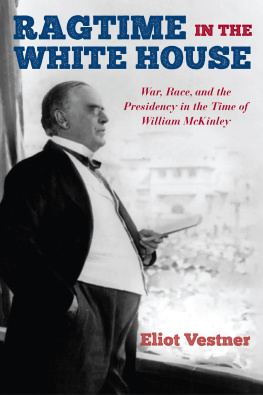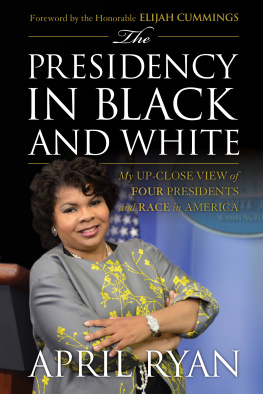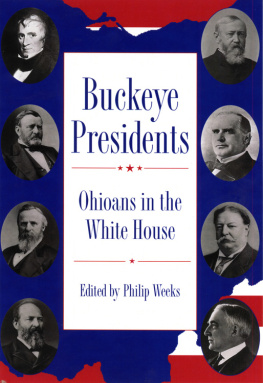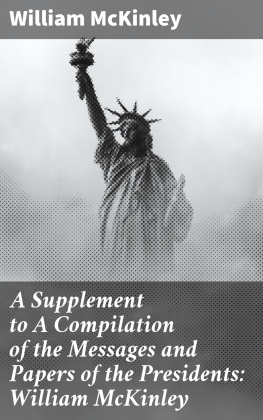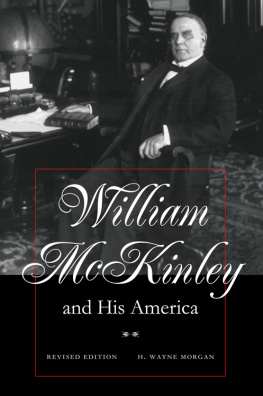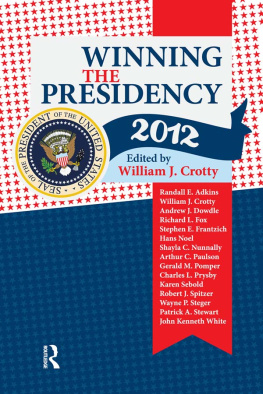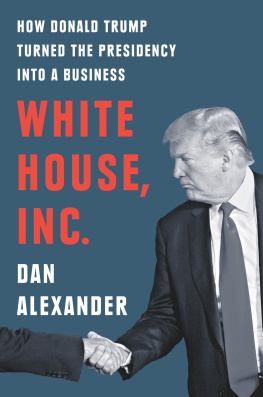Eliot Vestner - Ragtime in the White House: War, Race, and the Presidency in the Time of William McKinley
Here you can read online Eliot Vestner - Ragtime in the White House: War, Race, and the Presidency in the Time of William McKinley full text of the book (entire story) in english for free. Download pdf and epub, get meaning, cover and reviews about this ebook. year: 2020, publisher: City Point Press, genre: Politics. Description of the work, (preface) as well as reviews are available. Best literature library LitArk.com created for fans of good reading and offers a wide selection of genres:
Romance novel
Science fiction
Adventure
Detective
Science
History
Home and family
Prose
Art
Politics
Computer
Non-fiction
Religion
Business
Children
Humor
Choose a favorite category and find really read worthwhile books. Enjoy immersion in the world of imagination, feel the emotions of the characters or learn something new for yourself, make an fascinating discovery.
- Book:Ragtime in the White House: War, Race, and the Presidency in the Time of William McKinley
- Author:
- Publisher:City Point Press
- Genre:
- Year:2020
- Rating:5 / 5
- Favourites:Add to favourites
- Your mark:
- 100
- 1
- 2
- 3
- 4
- 5
Ragtime in the White House: War, Race, and the Presidency in the Time of William McKinley: summary, description and annotation
We offer to read an annotation, description, summary or preface (depends on what the author of the book "Ragtime in the White House: War, Race, and the Presidency in the Time of William McKinley" wrote himself). If you haven't found the necessary information about the book — write in the comments, we will try to find it.
Eliot Vestner: author's other books
Who wrote Ragtime in the White House: War, Race, and the Presidency in the Time of William McKinley? Find out the surname, the name of the author of the book and a list of all author's works by series.
Ragtime in the White House: War, Race, and the Presidency in the Time of William McKinley — read online for free the complete book (whole text) full work
Below is the text of the book, divided by pages. System saving the place of the last page read, allows you to conveniently read the book "Ragtime in the White House: War, Race, and the Presidency in the Time of William McKinley" online for free, without having to search again every time where you left off. Put a bookmark, and you can go to the page where you finished reading at any time.
Font size:
Interval:
Bookmark:


Copyright 2020 by Eliot Vestner
All rights reserved.
No portion of this book may be reproduced in any fashion, print, facsimile, or electronic, or by any method yet to be developed, without the express written permission of the publisher.
Published by:
City Point Press
P.O. Box 2063
Westport, CT 06880
www.citypointpress.com
Paperback ISBN 978-1-947951-26-6
eBook ISBN 978-1-947951-25-9
Book and cover design by Barbara Aronica-Buck
Cover photo courtesy of the Library of Congress
My special thanks to Olga Seham of Chappaqua, New York, for reviewing the entire manuscript and responding with candor and sensitivity.
I thank Charlie Vestner, my son, for his encouragement and useful criticism on a number of chapters; Alice-Lee Vestner, my daughter, for helping me prepare a bibliography; Lila Ackley, my granddaughter, for reading over the manuscript in its early stages and telling me what was clear and what wasnt. Friends also helped. My thanks to Steve Williams and Susan Potters, who reviewed chapters and offered helpful suggestions, and to Professor John Milton Cooper for reviewing the manuscript in its early stages and offering trenchant criticism. And I am grateful to Dr. John Arnold for research at the National Archives.
Thanks also to Mark Holland, archivist at the McKinley Presidential Library, and Michelle Guillion, archives director at the National First Ladies Library, for their help in locating and providing the photographs I needed. I thank Ann Sindelar, head of the Research Center at Western Reserve Historical Society, for locating manuscripts relating to McKinley, George Myers, and John Green; and I thank the staff in the Manuscript Reading Room at the Library of Congress, always patient and helpful during my many visits. I wish to especially thank Toni Vanover, branch manager at the Johann Fust Library of Boca Grande, Florida; her able assistant, Mary Knight Vickers; and Mary Warnement, head of Reader Services of the Boston Athenaeum, for their help in tracking down books and articles from various libraries, near and far.
Thanks also to Peter Hellman, distinguished photographer, for his photo of my portrait on the back cover. The portrait, by Deborah Hayes, solved the problem of getting me to smile for the camera.
I thank my old friend and fellow writer, Paul Hicks, for his steady encouragement and for finding me a publisher, David Wilk, to whom I am grateful for publishing this book and attending to all the details. I also wish to thank Davids team: Kate Petrella, who patiently edited the manuscript, Melissa Totten, who did a superb job of locating good photographs, book designer Barbara Aronica-Buck, and proofreader Jeremy Townsend.
I apologize if I have left anyone out. My excuse is the excuse of an old manfailing memory.
In the first year of the twentieth century William McKinley, twenty-fifth president of the United States, stood at the beginning of his second term, having decisively defeated his Democratic opponent, William Jennings Bryan. He dominated American politics as no other president since Abraham Lincoln. Nine months later he was dead, shot down in cold blood by an assassin, succeeded by his vice president, Theodore Roosevelt.
History played a trick on McKinley. He has been consigned to the shadows between Lincoln and Theodore Roosevelt, vilified or ignored by historians from Charles Beard, the pre-eminent American historian of the early twentieth century and a Marxist, to younger historians raised on the activist presidencies of Woodrow Wilson and Roosevelt. It is a richly undeserved fate.
A strong and important president, McKinley accomplished a lot in his first term. He won a war and forced the last European power from the Western Hemisphere; brought the nation out of one of our worst depressions; secured legislation protecting the gold standard, which anchored American monetary policy until the Nixon years; wrenched America from its international isolation; extended the reach of American power and influence across the Atlantic and Pacific; took the first steps toward building the Panama Canal; and put in place army reforms that prepared the nation to fight a world war in Europe. Under McKinley, the nation became a world power with global interests, respected and feared. The challenges he faced are still alive and unresolved. Presidents who committed our soldiers to Vietnam, Iraq, and Afghanistan might have learned about the problems of taking on determined adversaries in faraway countries by studying McKinleys war in the Philippines.
When McKinley was first inaugurated in March 1897 few predicted a successful presidency for him. There were many, friends and foes alike, who questioned what, if anything, lay below the surface of his kindly and charming personality. Did he have the backbone to be president in dangerous times? After his re-election in 1900, many of the doubters and nay-sayers changed their tune. So stands William McKinley at the threshold of his second administration, said the editor of the Chicago Tribune, who admitted to having been one of the doubters, every pledge redeemed, every awkward situation bravely met and wisely resolved, cool, well-poised, masterful, a man who yields only to have his every way in the end. Henry Macfarland, another doubter, similarly admitted in a long Atlantic Monthly article that McKinley had proved an outstanding, even great, president.
Critical to McKinleys success was his mastery of Congress. Senators, accustomed to running things, had assumed that the good-natured McKinley would do as he was told. Having served in Congress, he had a healthy respect for the role of that body as a co-equal branch of government and knew that congressional politics was personal. He made time to see members of both parties, treated everyone with charm and courtesy, and listened to what they had to say. Confronted with opposition, he didnt bully or browbeat, but relied on gentle persuasion. Illinois Senator Shelby Cullom said of him, We have never had a president who had more influence with Congress. Senator George Frisbie Hoar of Massachusetts, a friend and sometime opponent, said of McKinley, With his great wisdom and tact... he succeeded in establishing an influence over the... Senate not, I think, equaled from the beginning of the Government except possibly by Andrew Jackson.
Some contemporaries and historians looking back at McKinley and his times conceded his winning personality but claimed he was weak and lacking in courage. That he was neither loud nor boastful, moved cautiously, and held his cards close suggested to many that he was not a strong leader. Charles Olcott, writing the first major McKinley biography in 1916, interviewed Elihu Root, the leading member of both the McKinley and Roosevelt cabinets. He asked Root, Why do people say that McKinley was a charming man but not a strong character? Root replied with emphasis:
That is a great mistake! He had a way of handling men so that they thought his ideas were their own. I have talked with him again and again before a cabinet meeting and found that his ideas were fixed and his mind firmly made up. He would then present the subject to the cabinet in such a way as not to express his own decision, but yet bring about an agreement exactly along the lines of his original ideas, while the members often thought the ideas were theirs. He was a man of great power because he was absolutely indifferent to credit. His great desire was to get it done. He cared nothing about the credit, but McKinleyFont size:
Interval:
Bookmark:
Similar books «Ragtime in the White House: War, Race, and the Presidency in the Time of William McKinley»
Look at similar books to Ragtime in the White House: War, Race, and the Presidency in the Time of William McKinley. We have selected literature similar in name and meaning in the hope of providing readers with more options to find new, interesting, not yet read works.
Discussion, reviews of the book Ragtime in the White House: War, Race, and the Presidency in the Time of William McKinley and just readers' own opinions. Leave your comments, write what you think about the work, its meaning or the main characters. Specify what exactly you liked and what you didn't like, and why you think so.

